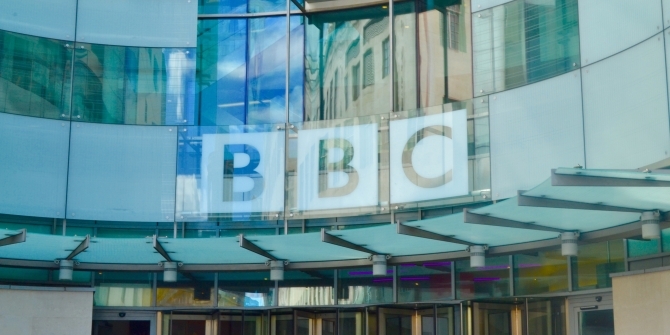 A UK government consultation asking for views on decriminalising TV licence evasion closed last week. Currently, everyone in the UK who watches or records television from any provider as it is broadcasted, and/or who watches content on BBC iPlayer, must pay the licence fee, and watching TV without it is considered a criminal offence. Looking at the BBC’s response to the consultation, LSE Professor Bart Cammaerts argues that this debate doesn’t actually address the most important issues at stake concerning the future of the licence fee.
A UK government consultation asking for views on decriminalising TV licence evasion closed last week. Currently, everyone in the UK who watches or records television from any provider as it is broadcasted, and/or who watches content on BBC iPlayer, must pay the licence fee, and watching TV without it is considered a criminal offence. Looking at the BBC’s response to the consultation, LSE Professor Bart Cammaerts argues that this debate doesn’t actually address the most important issues at stake concerning the future of the licence fee.
In other, non-coronavirus related, news (of which there is frightfully little), the BBC has responded to the government’s consultation on decriminalising non-payment of the licence fee. As expected, the BBC is against this and argues that a stick is needed to compel people to pay the universal licence fee of £157.50. The BBC does open the door, however, to reflections on more ‘efficient’ ways of collecting the fee, for example by linking it to other existing utility bills.
As I have argued before, I am not a huge fan of a licence fee to fund public service broadcasters, and while it would make sense to have a public debate about the funding mechanism of the public service broadcaster, a debate about decriminalising non-payment is less productive in my view. Neither the ideas of the current government nor those of the BBC really address my main concern regarding a universal fee, namely that it is, and would remain, a sort of flat-tax. This means that the very poorest of our society pay exactly the same rate as the billionaires, to put it in stark terms. In contrast, the fee hurts the wallet of a poor household much harder than it does the billionaire’s, or middle-class family’s wallets for that matter. Inequality is thus reflected in those that don’t or cannot pay, as well as in their repression and prosecution, which is disproportionately skewed towards the poor, those on benefits and single women, who all tend to be less able (or willing) to pay the fee, and to be at home during the times that inspectors do their visits.
The two most important arguments used in favour of an enforced flat-rate licence fee are that it guarantees public service broadcasters a form of financial independence (although technically, a yearly vote is needed from parliament to transfer the licence fee income from a fund to the BBC), but also that it creates a direct and strong connection between the broadcaster and its shareholders, i.e. all citizens. These are valid arguments, especially when confronted with an antagonistic and belligerent government eager to curtail the public service broadcaster, as is the case with the current Tory government. Furthermore, the lobby efforts of commercial media companies are also geared towards reducing the power, reach and financial clout of public service broadcasters, which they see as unfair competition.
This does not take away, however, the intrinsically unequal nature of the licence fee and that the punitive mechanisms to enforce its payment often amount to a criminalisation of the poor and vulnerable, especially young people and women. Besides this, the views of the BBC’s shareholders regarding how the public service broadcaster needs to be funded have in recent years shifted considerably, with a large majority of UK citizens now in favour of abolishing it. A ComRes poll published in February 2020 found that over 60% of those surveyed (online panel – N=2005) wanted the license fee abolished all together. Interestingly, this number increases to 68% amongst poor and working-class people. This does not mean, however, that support for the BBC and the idea of a public service broadcaster is wavering! Over 60% of those surveyed supported the statement that the BBC is ‘an important part of British culture’. Furthermore, only about 35% were in favour of a subscription service.
This leaves few options left, let me briefly sketch three possible ones. The first and most simple option would be to fund the BBC from general taxation, which is progressive and would also eliminate the considerable cost of enforcement, as everybody contributes through their general taxes. A variation on this could be a progressive media levy (just as we pay a progressive tax for national insurance), which could then be used to fund the BBC, but maybe also other public interest media initiatives, such as community radio, local news(papers), investigative journalism, etc. The second possible option would be to lift many more people out of having to pay the license fee, for instance the unemployed, pensioners, disabled, those on benefits, zero hours contracts, etc. This could be compensated for by making everyone else pay more, or by the state contributing in the context of its social policy (and thus also through general taxation). The third option would be to unclip the BBC’s wings in terms of its commercial ambitions, and thus to complement lower funding from the state or from license fees with more commercial activities, as is traditional in some European countries.
My preferred option has always been the first one, although I do see the importance of establishing a clear link between citizens and their public service media, so maybe an idea could be to develop a kind of progressive media levy that is income-dependent and sits alongside the national insurance contribution, but is geared towards supporting another vital public service, namely a commercially and politically independent and democratic media system (which as implied above, I see as broader than the BBC). This could also readily be combined with a system of social exemptions or with an income threshold, after which the democratic media levy kicks in.
This article represents the views of the author and not the position of the Media@LSE blog, nor of the London School of Economics and Political Science.





